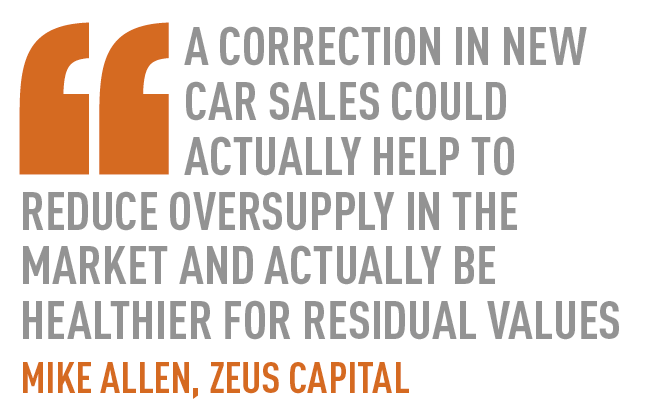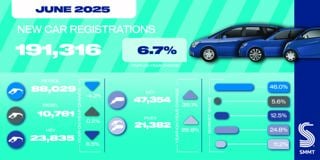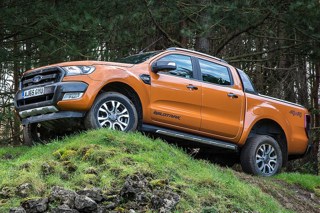At a time when even the most accomplished political commentators are unable to predict the progress of Brexit negotiations, it feels like a big call to forecast what 2018 may bring.
With the threat of 10% World Trade Organisation tariffs on imports if Theresa May’s team fails, the knock-on effect of rising new car prices and a more widespread impact on faltering consumer confidence, as well as further pressure on an already weakened sterling, would have serious repercussions.
Factor in consumers’ confusion surrounding the future of diesel, the pressures of meeting GDPR standards and another increase in the national minimum wage and the outlook could feel a little gloomy for franchised dealers.
Some groups are already taking action designed, at least in part, to provide some resilience against the coming changes.
Pendragon recently announced sweeping strategic changes that would see it increase its focus on used cars and its software division, Pinewood. The changes followed a warning that its underlying profit before tax was expected to fall more than 20%, from £75.4 million in 2016 to £60m by the end of the year.
The announcement came shortly after chief executive Trevor Finn told AM: “You could start off every year with a list of how it’s tough. You could have rates going up, the apprentice levy coming in, minimum wages coming in, threat of this and that, and you start with ‘X’ on your bottom line every year as a result. In a way, mitigating the cost of change is just a piece of business as usual.”
Perhaps all retailers will have to be more prepared to adapt to a more challenging environment in 2018, but what are the certainties among the challenges that car retailers will face in the New Year?
The fall of “Treasure Island”?
New car registrations for 2017 are expected to fall 4.8% year-on-year, to 2.565m units (2016: 2.693m), according to a forecast by the Society of Motor Manufacturers & Traders (SMMT), and a further 5.4% (to 2.426m) in 2018.
The SMMT blamed “economic uncertainty, compounded by Brexit fears” for putting off car buyers, adding that the Bank of England’s first interest rate rise for 10 years, putting the cost of borrowing up from 0.25% to 0.5%, in order to keep inflation in check, was likely to dampen consumer spending further.
AM OUTLOOK SURVEY 2018: CAR SALES
Franchised dealers‘ outlook on the new car market in AM's Outlook Survey 2018 reflects the predictions already voiced by the SMMT, with 72.46% expecting the market to contract in 2018. That 14.49% believe they will grow their new car sales in the new year perhaps raises questions about the franchise mix of those respondents. One expressed concerns about what he called “the market’s inevitable re-calibration”, stating: “Unfortunately, it comes at a time when Brexit, currency, and dieselgate are also taking hold.” Despite emission concerns potentially prompting reduced profit from diesel cars and competition for petrol-powered forecourt stock, used car sales are expected to take up the slack. A total of 57.97% of franchised dealers felt their used car sales would increase in 2018. Independents shared a more evenly balanced view of their business; with 38.98% believing used car sales will grow, 25.42% predicting a decline and 35.59% an unchanged market.”
However, the weakening pound and signs of strength in the European car market are as likely to affect registrations, as manufacturers divert volume away from the UK – a territory famously referred to as “Treasure Island”.
In his ‘Prospects for 2018/19’ report, Mike Allen, a market analyst for Zeus Capital, said the trend could see an easing of volume pressure and a renewed focus on profitability for retailers.
He said the channels facing the biggest threat would be pre-registrations, Motability and daily rental, as they are “areas where dealers make the least amount of marginal profit”.
“A correction in new car sales could actually help to reduce oversupply in the market and actually be healthier for residual values further down the line,” he added.
The AM100’s top two retailers, Sytner – which followed its January 2017 acquisition of car supermarket CarShop by buying The Car People as AM went to press (see our interview with Sytner chief executive Darren Edwards on page 32) – and Pendragon will be among those battling for a bigger slice of the used car market in 2018.
With franchised dealers’ profitability slipping to a £2,000 loss in October, according to ASE, the used sector is seen by many as a safer bet.
Tim Hudson, the managing director of Cox Automotive, believes car supermarkets have a business model that will flourish in 2018.
“Car supermarkets are growing and they are growing fast,” he said.
“In terms of social media, they are at the forefront and they are also leveraging the logistic supply chain to take advantage of the supply of nearly-new vehicles into the market.”
The demise of diesel
The used market does still present issues for the franchised dealer, however.
Not only will they be fighting the car supermarkets for a share of the pie, they will have to respond to the shift away from diesel, both in their stocking plans and their dealings with customers in 2018.
The SMMT has predicted that diesel will account for fewer than a million new registrations in 2018 and will have a market share of 40.7% – down 9.4 percentage points on 2017’s full-year forecast and the used market is starting to reflect the trend.
AM OUTLOOK SURVEY 2018: FUEL TYPES
The ‘Outlook 2018 Survey’ seemed to confirm that, ‘bad press’ or not, retailers are wising up to the dramatic shift away from new diesel cars.
A resounding 97.1% of franchised respondents felt sales of new diesel cars would decline in the new year, with a corresponding 73.91% expecting growth in petrol models and 82.61% predicting growth in EVs. Just 18.84% felt petrol car sales would maintain the same level as 2017 and 17.39% thought EV sales would remain flat year-on-year. Pressure on diesel prices and the potential for serious repercussions for residual values was highlighted by respondents’ views on the fate of used diesel vehicles. Among franchised retailers, 69.57% expected used diesel sales to decline and 79.66% of independents agreed. With the flow of used diesel vehicles into the market set to continue at an unabated pace, retailers can expect to stomach reduced margins on an increasingly unpalatable stock and writedowns if sales slow down.
Auto Trader reported that the average price of a used diesel car fell £143 month-on–month in November, compared with a £55 increase for the average used petrol car.
Pressure on residual values and dealer profits will be felt if the trend gathers momentum in the New Year.
Anti-diesel sentiment reached new heights in 2017 when the government’s Clean Air Strategy promised an end to sales of all non-hybrid petrol and diesel cars by 2040 and paved the way for local authorities to charge older diesel cars, which emit higher levels of nitrogen oxides (NOx), for entry to cities.
The mayor of London, Sadiq Khan, imposed an extra £10 daily charge on older diesel vehicles in the city.
Furthermore, the Chancellor, Philip Hammond, announced plans in the Budget to push all new diesel cars up by a tax band on April 1, 2018, unless they conform to next-generation Real Driving Emissions Step 2 standards, despite the standard not coming into force until 2020.
Meanwhile, the company car tax supplement for new diesel cars will be increased from 3% to 4%.
One AM reader described diesel’s fate as “a done deal”, adding: “In the longer term, diesel will become harder and harder to sell.”
According to data from Cap HPI, at the current rate of decline, diesel vehicles would still represent 30% of the market by 2020.
PricewaterhouseCoopers has predicted that 20% of the UK overall car parc will be EVs by 2020 and certain car retailers need to move fast to embrace the shift to electric power in 2018.
In the Budget, the Government not only removed benefit-in-kind (BIK) tax for EV users charging their vehicles at work, but invested £200m – to be matched by private investment – to create a new £400m Charging Investment Infrastructure Fund.
It will also provide £100m to guarantee continuation of the Plug-In Car Grant to 2020.
Within days of Hammond’s speech, Chargemaster announced the installation of 230 charging stations in Nottingham and 150 across Lancashire.
David Martell, Chargemaster’s chief executive, said: “We expect to see around 70,000 registered in 2018.”
Regulatory changes in 2018
The General Data Protection Regulation (GDPR) will come into force on May 25, 2018, and the fear surrounding potential breaches of the new data protection law was evident in the large crowds who attended AM’s GDPR seminar at Automotive Management Live in November.
The GDPR will give the Information Commissioner’s Office (ICO) the power to impose fines of up to €20m (about £17.5m), or 4% of a company’s global turnover.
The GDPR’s requirement to gain explicit opt-in permission for marketing materials sent to customers, and their right to demand deletion of personal data held under consent alone, could hamper many businesses’ promotional operations.
The Budget did contain some regulatory changes that could benefit franchised dealer groups in 2018.
Bringing forward to April 1, 2018, the planned switch in indexation from RPI to the main measure of inflation (currently CPI) will be a welcome move for motor dealers who have substantial property portfolios and will benefit from reduced increases in business rates.
Nathan Sutcliffe, a tax manager at MHA MacIntyre Hudson, said UK-wide, the change would amount to “a reduction of taxation by £290m in 2018/19 compared with 2019/20”.
However, the Government will also freeze the corporate indexation allowance, which allows for the effects of inflation when calculating the chargeable gains of companies, from January 1.
Sutcliffe said: “This will be an unwelcome move for motor dealers with substantial property portfolios who will be impacted on future
property sales by an increased capital gains tax cost.”
PCPs and motor finance
PCPs were in the national media spotlight several times in 2017 as, along with rising car prices, November’s 0.25ppt rise in interest rates, a possible fall in RVs, and faltering consumer demand raised fears of a crash in motor finance, with UK lenders exposed to £24 billion of loans in the sector.
However, the Bank of England’s simulated stress tests – it modelled scenarios including a severe recession, a slide in the pound, the worst collapse in the housing market in history, soaring unemployment and a global economic slump – were passed by HSBC, Lloyds, Nationwide, Santander and Standard Chartered in November.
AM OUTLOOK SURVEY 2018: FINANCIALS
Franchised respondents to the AM ‘Outlook 2018 Survey’ were marginally more bullish about their prospects for turnover and used car finance growth, with 26.09% expecting turnover growth in 2018 compared with 25.42% of independents. Despite the overall outlook being a smaller turnover, fewer franchised operators also felt the new year would see turnover fall – 50.72% against independents’ 54.24%. Profitability was expected to grow by 24.64% of franchised dealers, but 57.97% expected to suffer a reduction, while 22.03% of their independent counterparts expected increased profitability and 55.93% expected a decline. The real clue to franchised retailers’ used car ambitions came from their views on used car finance. While just 28.81% of independents thought their finance business would generate growth in 2018, 39.13% of franchised operators were pinning their hopes on an increase. Just 18.84% of franchised operators expected new car finance growth.
Andrew Smith, a consumer credit director at Compliancy Services, suggested fears of a crash were the result of “the press clutching at straws for a story”, but he conceded that the FCA would be looking to “make examples” of unscrupulous lenders in 2018.
His comments were echoed by Frank Brown, managing consultant at financial services regulatory consultants Bovill. He said: “The FCA are currently scrutinising the motor finance sector, and this will continue throughout 2018.
“Key areas of review are affordability, incentive schemes and conflicts of interest – internal conflicts and those between dealers and finance houses.
“While much of the initial focus has been in the sub-prime sector, it is expected that this will widen to cover the whole of motor finance.”
Brown highlighted other significant new regulation coming into force in 2018. The EU’s Insurance Distribution Directive regulation aims to foster more transparency in insurance sales, but does not require disclosure of commissions.
On top of that is the Senior Managers and Certification Regime, which will bring “significant administrative overheads”, he said.
The FCA warned: “Under-preparation for major regulatory change is not acceptable. Based on what we have identified, we feel it is important to remind all firms of the need to ensure that regulatory changes are managed effectively in future.”
Manufacturers: direct sales and shrinking retail spaces
Car manufacturers may begin to make more significant network changes in 2018.
Vauxhall and Volkswagen are among the brands most keen to drive change as they seek to further cut costs and improve profitability in 2018.
AM OUTLOOK SURVEY 2018: BUSINESS PERFORMANCE
More than a third of car retailers told AM’s ‘Outlook 2018 Survey’ that they expected to trim their headcount in 2018. Following the announcement of another increase to the National Minimum Wage in April 2018 and warnings of a shrinking workforce due to the uncertainty surrounding Brexit, staffing costs are expected to increase (see our talent feature on page 72). A total of 36.7% of respondents expressed an intention to reduce their headcount, with just 11.7% expecting to grow their numbers. Investment in acquisition is also likely to slow as many businesses target stability. Just 15.6% of respondents said they would be committing more cash to acquisitions in 2018, while 35.9% said they would be cutting back. One survey respondent warned: “It will be a difficult trading year for all and more so on those who are not lean, fit and well prepared.”
Volkswagen has already said it will shrink its 3,000-strong European retail network by 10% in an attempt to cut costs and increase average return-on-sales from 1% to 2%.
It is also planning to scale down its facilities, according to Reuters.
Volkswagen will also join a growing number of manufacturers embracing online direct sales in 2018.
While the online-led new Geely brands Polestar and Lynk & Co – the latter ditching the traditional dealership altogether – do not arrive in the UK until 2019, it is likely that other manufacturers will increase their focus on online activities as they try to forge a direct link with customers to address the threat of the GDPR.
In the case of Mitsubishi, this trend is likely to drive a greater emphasis on small urban stores, such as those already employed by Hyundai, Jaguar Land Rover, Dacia and Seat.
Lance Bradley, Mitsubishi’s managing director, said the strategy would “solve the cost-of- representation issue in city-centre locations like London, Birmingham and Manchester”.
Workforce worries
Economic and political forces will add to car retail group’s workforce worries in 2018.
In late October, Heath Evans, the managing director of Assured Group, told AM that the labour pool in the car preparation sector had declined by 40% since the Brexit vote and retailers could expect “significant price inflation” as a result.
Evans said: “In our experience, we are seeing people leave the UK due to the uncertainty with Brexit and the drop in value of the pound.
“We are also seeing a shift where people are no longer willing to work on a self-employed basis.”
While Brexit was blamed for a rise in inflation (it hit 3.1% in November, 1.1 ppts above the Bank of England’s target) that could put further pressure on wages in 2018, the Government’s decision to further increase the National Minimum Wage in April 2018 will certainly result in a rise in overheads. The National Living Wage will rise 4.4% to £7.83 per hour in April.
Car retailers with more than 250 employees will also have to report details of their businesses’ gender pay gap by April 4, 2018.
The Equality Act 2010 (Gender Pay Gap Information) Regulations 2017’s (SI 2017/172) rule on gender pay gap reporting for businesses with more than 250 employees were brought into force on April 6, 2017, but must take 12 months of pay data into account.
Kate Palmer, head of advisory at HR, employment law and health & safety consultancy Peninsula, told AM: “There is no leeway with this date, so it is important this isn’t missed.”



















Login to comment
Comments
No comments have been made yet.